At the start of the game the pieces are set out as shown below.
The perimeter squares are shaded grey.
The goal squares are red and blue.

When a piece is moved it can be moved one square in any direction, and then if wished another square in any direction, and then if wished another square in any direction. A total of three squares.
Pieces can't move on to, or jump over a square that is already occupied by another piece.
Pieces can't jump
over the ball.
E.g.
In the diagram below the red piece can move on to any of the green
squares. It can't move on to any of the light blue squares.

When a piece is moved on to a square that is occupied by the ball, the ball is pushed off its square and on to the adjacent square, in the direction in which it was pushed.
The ball is not allowed to be dribbled on to a square that is already occupied.
The diagrams show red dribbling the ball past blue.
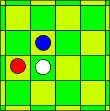
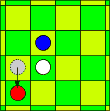
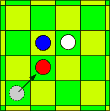
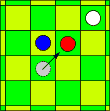
If a piece is adjacent to the ball and has a step left (See the 3 step rule) it can pass the ball. The piece stays where it is and the ball is moved in a straight line away from the piece along a row, a column, or a diagonal. See the diagrams below
The line of pass must be free of both the passing player's pieces and the opponent's pieces. (Compare with the movement of a queen in Chess)
A pass can be any distance provided it complies with zone restrictions. (See Zone Restrictions)
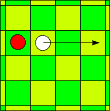

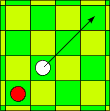
When a piece is used
it can have three steps.
A step can be moving, dribbling or passing.
Here
are some examples:
Move three squares.
Move one square, dribble one square, and move another square.
Pass then move two squares.
Move two squares then pass.
Dribble one square then pass.
And so on.
A Final Example - and a very useful technique of play is shown below.
Red dribbles the ball one square forward, moves to the side and makes
a diagonal pass.
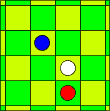
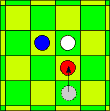


Each turn a player can use two pieces.
A player can't use one piece and let it have six steps.
A player can't take one or two steps with piece A, then move piece B, and then take the remaining step(s) with piece A
The ball must be shot (passed) from inside the shooting zone on to one of the five goal squares.
The
diagram below shows red attacking the blue goal.
Piece A moves two squares and passes the ball to the edge of the red shooting
zone.
Piece B moves two squares and shoots.
GOAL!
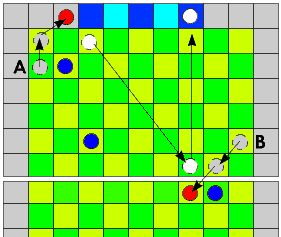
The ball is not allowed on the perimeter squares but the pieces are.
The red team is allowed only one red piece on its goal squares at any one time. The blue team is allowed only one blue piece on its goal squares at any one time.
A piece can't dribble or pass the ball from the neutral zone back into his opponent's shooting zone.
The ball cannot be passed from one shooting zone straight into the other shooting zone.
While
the ball is in your opponent's shooting zone you are allowed a maximum
of only two passes. If after your second pass the ball is still in
the shooting zone then you must attempt to dribble the ball into the neutral
zone.
